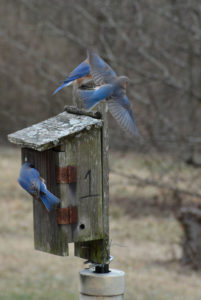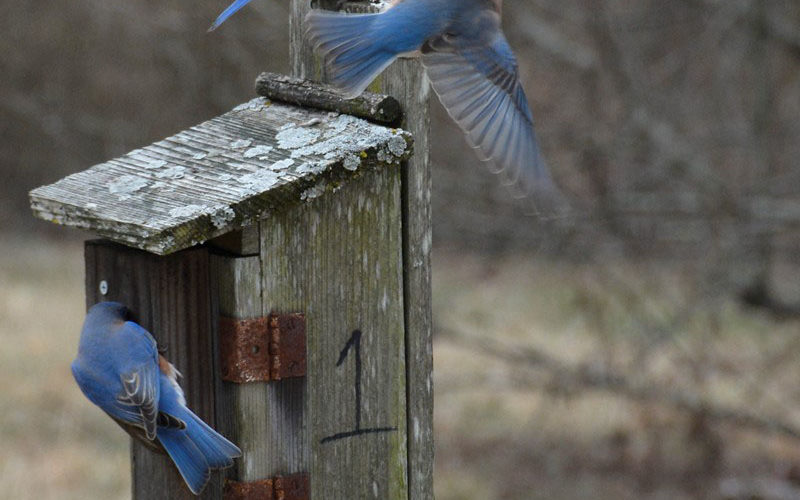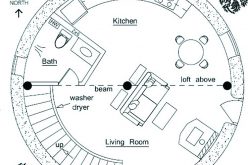Friends at night, birds may squabble by day
AMANDA BANCROFT
Making Ripples
The bleak wintry landscape of hay-colored hills and bare branches is suddenly interrupted by flashes of deep blue, as though parts of a clear sky had come down, alive, to do somersaults near the ground. This peculiar phenomenon is repeated week after week, so that my mornings have become a dance of doing chores and glancing out the window. The flittering blue things are eastern bluebirds, battling it out over nest box No. 1 nearest our cabin.
To see two bluebirds at a nest box is common, and during nesting season, two pairs may have a disagreement about which of them should set up housekeeping. For me to see five, six or more bluebirds regularly duking it out in winter is a novelty. Two birds are usually inside the box, with two hanging diagonally off the edges of the hole, whether to peek inside or prevent departure like a hostage situation, I can’t be sure. Several bluebirds will joust on the roof, while a couple more fly by and displace them. I observed a male on the top of the box with a female, repeatedly pecking her head like a jackhammer until she flew off. Their bright blue plumage and fluffy white and buff bellies make their battles a spectacle both beautiful and terrible to behold.
Why would they fight outside of nesting season? Short of mindreading their little bird brains, we’ll never know for certain, but there are plausible explanations. Ornithologists have offered several reasons: getting a head start on nesting season; confusion due to climate change; driving away the sons of the family flock; and so on. Earlier springs mean earlier nesting behavior. But I prefer the explanation suggested by local birder Joe Neal.
Territorial or aggressive behavior can be observed throughout the year as part of a bird’s repertoire, Neal says. It’s just natural, whether it’s nesting season or midwinter. Sure, there might be snow on the ground, but that male bluebird will still peck a female’s head (which happens to be part of mating behavior, as well). Our resident bluebirds do sometimes behave as though they were nesting in the fall or winter, and never fully abandon the nest boxes.

Several bluebirds vie for a perch on a nest box near Fayetteville this month. Even in winter, pecking and other aggressive behavior can be observed.
(Courtesy Photo/Amanda Bancroft)
Bluebirds have been known to survive extremely cold nights by huddling together inside tree cavities or boxes to share body heat and stay warm. So it seems that they are best buddies at night, and upon emerging from their shared bedroom in the morning, declare war on each other! To deter fighting, there’s not much we can do (even if you walk outside and break up the fight, they’ll probably continue fighting later, especially over a female). Try to ensure there are enough nesting boxes with predator guards available for breeding pairs, and maintain them well. Other than that, enjoy watching bluebird families all year round.
Amanda Bancroft is a writer, artist, and naturalist living in an off-grid tiny house on Kessler Mountain. She and her husband Ryan blog about their adventures and offer tips to those wanting to make a difference at www.RipplesBlog.org.










